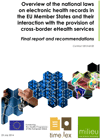 The objective of this Study is to provide an overview of the current national laws on electronic health records (EHRs) in the EU Member States and their interaction with the provision of cross-border eHealth services mentioned in Directive 2011/24/EU. This entails first to identify and examine the national laws of the 28 Member States and Norway and identify legal barriers for cross-border transfer data from electronic health records and for the provision of cross-border eHealth services; and second, to make recommendations to the eHealth Network on how the national laws and the European framework must evolve to support cross-border eHealth services.
The objective of this Study is to provide an overview of the current national laws on electronic health records (EHRs) in the EU Member States and their interaction with the provision of cross-border eHealth services mentioned in Directive 2011/24/EU. This entails first to identify and examine the national laws of the 28 Member States and Norway and identify legal barriers for cross-border transfer data from electronic health records and for the provision of cross-border eHealth services; and second, to make recommendations to the eHealth Network on how the national laws and the European framework must evolve to support cross-border eHealth services.
The first step of this study was the completion of national reports describing the legal requirements applying to EHRs based not only on the existing legislation, but also on planned measures (e.g. draft legal initiatives). As a second step, the information provided in the national reports was used for the purposes of the comparative analysis. Finally the draft recommendations were mainly built upon the findings of the comparative analysis.
Download: Overview of the National Laws on EHR in the EU Member States and their Interaction with the Provision of Cross-Border eHealth Services (.pdf, 1.502 KB).
Download from eHealthNews.eu: Overview of the National Laws on EHR in the EU Member States and their Interaction with the Provision of Cross-Border eHealth Services (.pdf, 1.502 KB).